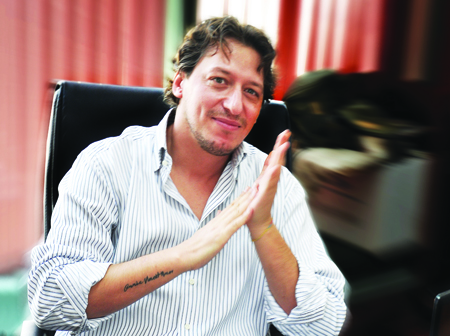While most MENA film distributors are focused on marketing films through conventional channels, Front Row Filmed Entertainment has forged ahead with some exclusive partnerships that are making Arabic content more easily available on SVOD platforms worldwide. Gianluca Chakra, Front Row's Managing Partner, speaks about how this strategy has helped foster a more creative talent pool in the region.

While most MENA film distributors are focused on marketing films through conventional channels, Front Row Filmed Entertainment has forged ahead with some exclusive partnerships that are making Arabic content more easily available on SVOD platforms worldwide. Gianluca Chakra, Front Row’s Managing Partner, speaks about how this strategy has helped foster a more creative talent pool in the region
Three years ago, Gianluca Chakra, Managing Partner at Dubai film distributor Front Row Filmed Entertainment, signed an agreement to become the official iTunes aggregator for the Middle East & North Africa (MENA) region. Today, the company has helped add around 500 Arabic titles on iTunes. More recently, Chakra secured an exclusive deal with Google Play/YouTube, which means anyone in the region who wants to place their film on these platforms will need to go through Front Row.
Even back then, Chakra expressed an interest in marketing more Arabic content through SVOD and transactional platforms. This year, Front Row finally entered into its first co-production arrangement with Egyptian production house Shadows Communications, Kuwait National Cinema Company (KNCC) and iflix.
The first season of their co-production, Tough Luck, a 30-episode show boasting some of the biggest names in the Arab world including Egyptian star Ahmed Helmy, Ahmad Sakka, Mona Zaki, Mai Kassab, Ahmad Fahmi, Shiko and Nicold Saba, premiered as an iflix original on the SVOD platform during Ramadan. Iflix secured exclusive SVOD rights for the programme in the MENA region, Southeast Asia, Sub-Saharan Africa, Central America, Asia Pacific and the Commonwealth of Independent States. The second season, also with 30 episodes, is tentatively scheduled to launch on the SVOD service in November.
The plot revolves around three families who reside in a dilapidated building in Cairos renowned 5th district, and the comedy of errors that emerges from attempting to fix the crumbling building. The show has more than 40 guest appearances from top Arab talent.
Our core business revolves around acquiring rights for this region and distributing them across the MENA, explains Chakra.
Tough Luck was an attempt to try something new and encourage SVOD players like iflix, among other international platforms, to consider local productions and create a more competitive environment across the region.
This can result in more products being made to satisfy the many platforms across the region, be it on linear or non-linear channels. In parallel, this meant that new content will come in and, in turn, bring new talent. This is what the region needs. One never knows if one of these will eventually become the new HBO for the Arab world. Arab audiences want higher standards, and I think with more competition, producers will be compelled to strive for excellence.
Chakra clarifies the many variables that make SVOD immediately attractive to talent and to audiences across the world, and the opportunity these platforms offer to showcase content that linear channels have thus far avoided.
On the one hand, we have a lot of talent in this region and SVOD platforms give them a greater opportunity for visibility than the current linear channels. Egypt is really the Hollywood of the Middle East, but the producers there primarily only sell to the cinemas or later to conventional channels, and thats how far their content goes.
Unless you are a director like Nadine Labaki, who is a Cannes sweetheart and gets most of her films financed from Europe, the rest of the producers are stuck with the same old formula. There is so much talent in this region and so many writers in Lebanon. These up-and-coming SVOD platforms give talented professionals new platforms to showcase their work.
Chakra points out that there is a large Arab diaspora around the world, especially in South America, the US, parts of Europe and even in Japan.
Those are markets that no one is tapping into. In Lebanon, we only have a population of four million, but there are around 14 million Lebanese living in South America alone.
Having seen the success of Tough Luck, Chakra and Shadows are working on independent and co-productions with the aim of producing more Arabic content for SVOD platforms.
We know for a fact that people want more daring content and new subject matter that TV stations are not comfortable showing. A Game of Thrones or a Narcos would never have come to light if it wasnt for Netflix or HBO featuring them. SVOD has been successful because it provides a more open platform and greater accessibility.
As a distributor, Chakra is obviously well versed in the art of marketing the content he has rights to. Front Row was responsible for making Very Big Shot, a Lebanese film available on Netflix worldwide.
It was the first Lebanese film on Netflix. Automatically, this means that the filmmakers are now known worldwide and it will be easier for them to get their next film financed, he points out.
Chakra has always been a big advocate of nurturing local talent. Of the 90-120 films the company distributes each year, 40 are slated for local theatrical releases while the rest are all aimed at VOD, TV or SVOD. Front Row was the first to sign a massive game-changing pay-TV output deal with beIN Media Group as well, two years ago.
As a distributor, the company has kept all avenues open for content distribution. Front Rows aggregation services department, for instance, handles all requirements for those who want their movies on iTunes. They have a similar exclusive arrangement with Google Play and Netflix.
We are negotiating with other international SVOD platforms as well, Chakra explains, adding that there is a whole quality check process involved.
We must go through a whole encoding process and undertake quality checks. They then have their own set of quality checks. We do this for distributors who want their content on these international platforms, as well as local VOD platforms through telcos; we handle rights management as well as marketing.
Chakra says he is constantly on the look-out for new talent and productions with more daring subject matter.
Why cant we do the true story of a drug lord in Lebanon, for instance? It is all about subject matter. TV stations decline those kinds of pitches, but then the whole world is watching Narcos. It could be about a drug lord, as it could be about some controversial time in history. Then again, this same region is obsessed with shows like Game of Thrones. Why cant we have an Arab equivalent to that?
We need competition, because competition means growth. The new generation of Netflix addicts and a lot of the Arab audiences among them are not being serviced. We need to change that, he says.















































































